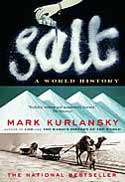
Salt: A World History
Mark Kurlansky
484 pages, including index
published in 2002
As you may have guessed from the title, Salt is an exploration of the history of salt use from prehistoric times until today. In the course of which, not just the physical aspects of salt are treated, but also the cultural, political, economical and other aspects of our enduring obsession with NaCl. As such, Salt is broadranging, exactly the kind of non-fiction book I enjoy the most. Especially because Kurlansky doesn't just talk about salt, but brings in everything that's closely related to salt, from the way the ancient Chinese first learned to use natural gas welling up from their salt mines, to the psychological theories Freud and his disciples built up around salt.
For the most part, this makes for interesting reading: Kurlansky clearly knows his subject and is eager to tell about it, but at times the incredibly amount of detail becomes wearisome, especially in later chapters. The book also suffers from being forced into a narrative of progress, an unfolding history of the ever more sophisticated methods of producing salt culminating into the 20th century's use of salt as an essential chemical for literally thousands of processes.
Because of this, the focus is too much orientated on the west, not enough on other cultures. The progress is a familiar one: prehistory-Egypt-Greece-Rome-Medieval-Renaissance-Europe-England-America, with sidetrips to China. I would have loved it if Kurlansky had spent more time on the use of salt in African cultures, as he did for e.g. Rome and somewhat less time on e.g. the use of salt in cod fishing.
In all, a flawed but still worthwhile look into the history of Salt.
